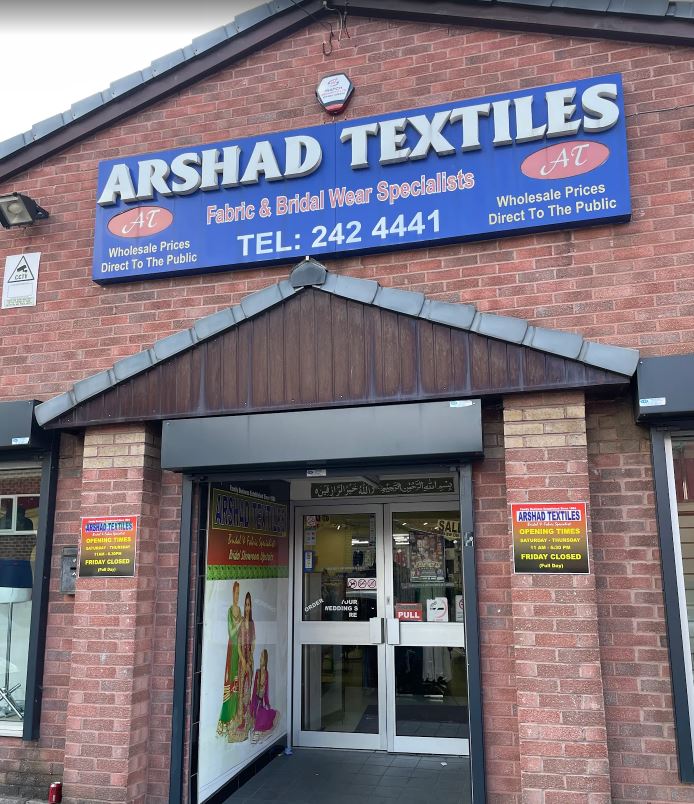
The glass-fronted showroom of Arshad Textiles in Sheffield feels more like a boutique atelier than a fabric store on a calm weekday afternoon on Rushby Street. Soft patterns are created on the white-tiled floor as sunlight filters through delicate chiffon displays. The rustle of organza, the fold of cotton, and the hum of shoppers debating suit colors in three different languages all contribute to the rhythm here, rather than music. One of the reasons Arshad Textiles is still a legendary name in northern retail fashion is because of that rhythm, which has been surprisingly constant over the years.
Since its establishment, Arshad Textiles has gradually developed into a leading source for bridal gowns and high-end ethnic fabrics. The store has developed a devoted and surprisingly varied clientele by carefully selecting each product drop. The shop is frequented by brides from Yorkshire to Birmingham who are looking for opulent dupattas, shararas with lots of satin, or personalized embroidered maxis for Mehndi evenings. These consumers are embracing stylistic reinvention and maintaining traditions in addition to purchasing clothing. Often hailed as remarkably effective at reducing decision fatigue during high-pressure planning seasons, the Arshad experience is especially personal.
Arshad Textiles Fabric Shops Sheffield
| Detail | Information |
|---|---|
| Business Name | Arshad Textiles Ltd |
| Address | 55–61 Rushby Street, Sheffield, S4 8GN, United Kingdom |
| Phone | +44 114 242 4441 |
| WhatsApp Orders | +44 744 8852132 |
| Website | www.arshadtextiles.co.uk |
| @arshadtextiles (11.7K+ followers) | |
| Arshad Textiles Fabric & Bridal Wear Specialist (9.8K followers) | |
| Primary Services | Fabric retail, bridal wear, unstitched clothing, shawls, perfumes |
| Target Audience | Brides, boutique shoppers, modest fashion consumers, ethnic fashion buyers |
| Price Category | Mid-range (affordable for occasion wear) |
Arshad Textiles has bravely risen from Sheffield’s fabric scene to national prominence in recent years. They have established a dynamic and incredibly effective online presence by utilizing social media sites like Facebook, Instagram, and TikTok. In a matter of hours, short videos showing unstitched suits, bridal fittings, or the unveiling of the Eid collection can garner thousands of views. Every post has a distinctive look that is rich in texture, detailed, and intended to pique readers’ interest right away. This is marketing that is based on genuineness and strong community resonance, free of gimmicks.
Arshad’s strategy stands out as being especially creative in the textile retail industry, where many stores follow recurring patterns. Arshad carefully strikes a balance between supply and exclusivity, whereas competitors place a greater emphasis on volume. Launched shortly before significant cultural festivals, limited-edition collections frequently sell out in a matter of days. Customers frequently bring family members, mood boards, and screenshots of famous people’s attire, and they plan their visits well in advance. The store’s identity is based on this cross-pollination of cultures, from Bradford to Bollywood.
Through partnerships with well-established South Asian manufacturers, the company imports a broad range of textile products under various commodity codes. These include intricate bridal materials from Lahore and Gujarat, specialty shawls with technical weaving, and extremely durable coated fabrics for outerwear. Arshad provides both raw material and inspiration for independent designers and medium-sized fashion houses in the UK. It has subtly evolved into a supply chain hub, linking regional fashion aspirations with international textile networks.
Younger consumers’ perceptions of ethnic clothing have also changed in recent years. Embroidered tunics and palazzo suits are no longer limited to religious ceremonies or family weddings; they are now seen at editorial shoots, university events, and even red carpet events. Influencers like model Neelam Gill and Kaushal Beauty have emphasized traditional South Asian silhouettes as fashion statements rather than merely traditional attire. Particularly sensitive to these changes has been Arshad’s inventory, which is regularly updated to account for seasonal trends. For instance, their pastel-hued co-ord sets and plachi shawls were showcased on influencer pages during the most recent Eid sale, with many praising the items for their remarkably clear craftsmanship and surprisingly low prices considering the detailing.
The store’s logistical agility is noticeably better. Daily orders are now placed via WhatsApp, and the team has trained employees to reply promptly and fluently. With just one message, customers in the UK—particularly those in Manchester and Leicester—can now discuss color availability, secure pieces, and receive customized images. This model, which is based on trust and real-time communication, is more akin to custom tailoring than mass retail. It demonstrates how the store can combine cutting-edge equipment with classic customer service principles.
Through the introduction of accessories and ready-to-wear perfume sets, Arshad Textiles has increased its involvement in ceremonial shopping. Now, guests can get the whole look in one place, from the wedding gown to the complementary scent. Families with tight deadlines for engagements or weddings will especially benefit from this integrated offering. The ease with which this has been executed without lessening the store’s initial purpose is also heartening.
Ethnic textile retailers in the UK have encountered several difficulties in the last ten years, including shifting import regulations and the emergence of competitors that only operate online. However, by paying close attention to its base and anticipating their needs, Arshad Textiles has managed to stay incredibly dependable. Their brand equity has been greatly enhanced by their ongoing investments in employee training, inventory rotation, and community involvement—through charity events, fashion pop-ups, and partnerships with nearby schools.
Arshad quickly changed course during the pandemic, when many small retailers were forced to close their doors forever. They maintained high customer engagement and sales by transforming Instagram and WhatsApp into virtual stores. This flexibility, which is fueled by a group of people who are obviously dedicated to the brand’s long-term goals, shows a resilience that goes far beyond financial indicators. Consumers were maintaining relationships based on years of shared celebrations rather than just purchasing clothing.
The store’s trajectory appears to be set up for future growth in the upcoming years. The chance to open pop-up stores in other UK cities or even test a flagship in London seems appropriate and natural given the company’s robust social media following and steady product quality. Arshad’s collection of finely crafted, culturally significant items feels not only essential but also stylish as ethnic fashion becomes more and more discussed in the general public.
